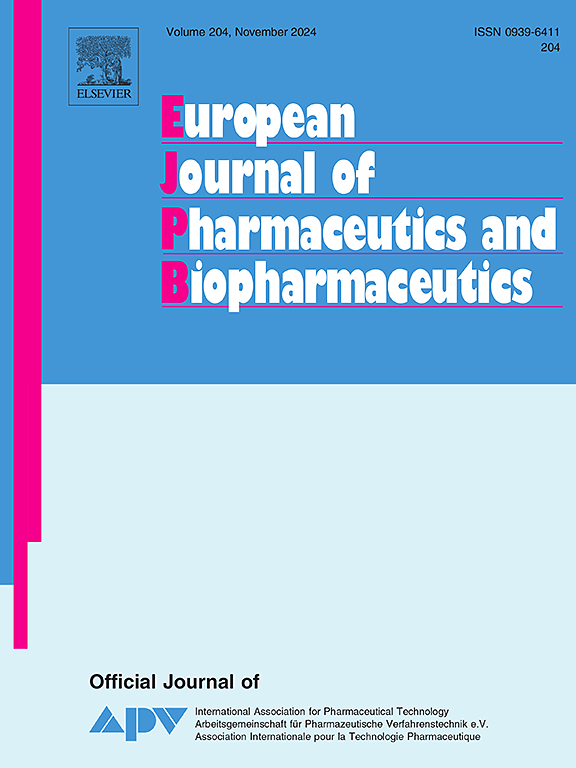细胞外囊泡递送雷帕霉素改善肿瘤微环境,增强肝癌免疫治疗。
IF 4.4
2区 医学
Q1 PHARMACOLOGY & PHARMACY
European Journal of Pharmaceutics and Biopharmaceutics
Pub Date : 2025-04-04
DOI:10.1016/j.ejpb.2025.114714
引用次数: 0
摘要
肝细胞癌(HCC)是全球最常见、最致命的恶性肿瘤之一,由于其肿瘤免疫抑制微环境(TIME),治疗方案十分有限。在此,我们设计了源自肝细胞癌细胞的细胞外载体(EVs),以包裹雷帕霉素负载的纳米颗粒(Rapa-EVs),用于 HCC 的精准治疗。实验结果表明,Rapa-EVs 提高了水溶性和稳定性。Rapa-EVs具有很高的细胞吸收率,能有效靶向肿瘤组织,促进树突状细胞(DC)成熟,从而激活CD8 + T细胞。它们能直接抑制H22细胞增殖,促进巨噬细胞M1极化。Rapa-EVs 还能使异常的肿瘤血管正常化,从而改善药物灌注和免疫细胞浸润,抑制肿瘤转移。这种设计协同利用了 EVs 的天然肿瘤靶向特性,实现了雷帕霉素的选择性递送,同时利用其固有的免疫原性增强了抗肿瘤免疫力,并协调了雷帕霉素介导的 TIME 重塑。通过全面的体外和体内评估,我们的研究建立了一种将生物仿生给药与微环境调节相结合的 HCC 治疗范例,为克服耐药性和改善患者预后提供了一种变革性方法。本文章由计算机程序翻译,如有差异,请以英文原文为准。

Extracellular vesicles delivered rapamycin to improve the tumor microenvironment and enhance hepatocellular carcinoma immunotherapy
Hepatocellular carcinoma (HCC) is one of the most common and lethal malignancies worldwide with limited therapeutic options due to its tumor immunosuppressive microenvironment (TIME). Herein, we engineered extracellular vehicles (EVs) derived from hepatocellular carcinoma cells to encapsulate rapamycin-loaded nanoparticles (Rapa-EVs) for precision HCC therapy. The experimental results demonstrated that the Rapa-EVs improved water solubility and stability. Rapa-EVs showed a high cellular uptake rate and could effectively target tumor tissues, promote dendritic cell (DC) maturation, and thereby activated CD8 + T cells. They directly inhibited H22 cell proliferation, promoted macrophage M1 polarization. Rapa-EVs also normalized aberrant tumor vasculature to improve drug perfusion and immune cell infiltration, inhibited tumor metastasis. This design synergistically harnesses the natural tumor-targeting properties of EVs to achieve rapamycin-selective delivery, concurrently leveraging their intrinsic immunogenicity to prime antitumor immunity while coordinating rapamycin-mediated TIME remodeling. Through comprehensive in vitro and in vivo evaluations, our study establishes a paradigm for HCC therapy that integrates biomimetic drug delivery with microenvironmental modulation, offering a transformative approach to overcome treatment resistance and improve patient outcomes.
求助全文
通过发布文献求助,成功后即可免费获取论文全文。
去求助
来源期刊
CiteScore
8.80
自引率
4.10%
发文量
211
审稿时长
36 days
期刊介绍:
The European Journal of Pharmaceutics and Biopharmaceutics provides a medium for the publication of novel, innovative and hypothesis-driven research from the areas of Pharmaceutics and Biopharmaceutics.
Topics covered include for example:
Design and development of drug delivery systems for pharmaceuticals and biopharmaceuticals (small molecules, proteins, nucleic acids)
Aspects of manufacturing process design
Biomedical aspects of drug product design
Strategies and formulations for controlled drug transport across biological barriers
Physicochemical aspects of drug product development
Novel excipients for drug product design
Drug delivery and controlled release systems for systemic and local applications
Nanomaterials for therapeutic and diagnostic purposes
Advanced therapy medicinal products
Medical devices supporting a distinct pharmacological effect.

 求助内容:
求助内容: 应助结果提醒方式:
应助结果提醒方式:


